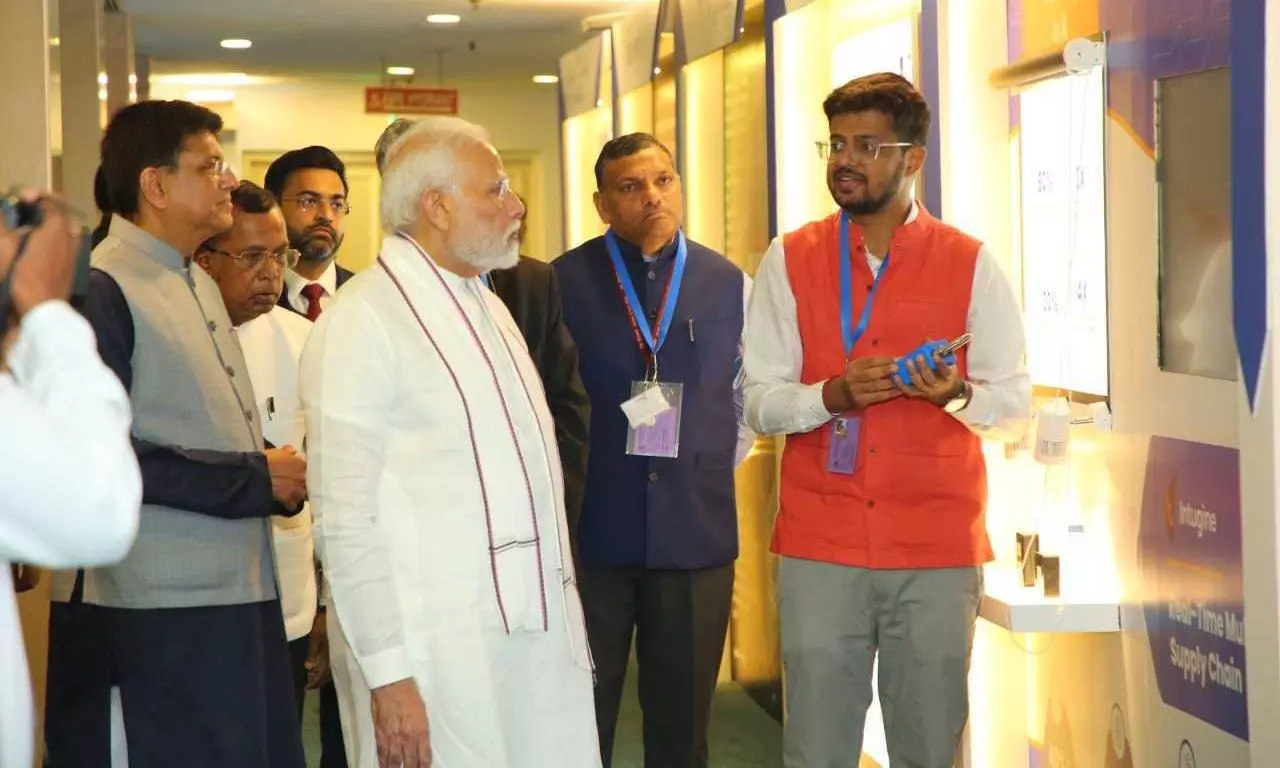Logistics tech platform Intugine integrates with ULIP
The company can now provide data on goods from source to destination as it achieves complete integration with FASTag Sarathi and Vahan, FOIS, Port Community Systems, air cargo visibility through ACMES, ACCS and AAICLAS

Mrinal Rai, co-founder and COO, Intugine giving the demo to prime minister Narendra Modi showcasing the capabilities of the platform along with the launch of National Logistics Policy.
Multimodal platform company Intugine has emerged as one of the early companies to integrate with the Unified Logistics Interface Platform (ULIP).
The company has successfully integrated with the IT systems of various union ministries, state departments, governing bodies, and private service providers. Intugine now has an improved real-time multimodal visibility solution, with access to data from systems such as FASTag, FOIS, PCS and ACMES, giving their clients a single-screen view of all their shipments across modalities.
Intugine can fetch FASTag data from more than 800 tolls across the country for toll-based visibility of 90+ lacs commercial vehicles on the road while deriving actionable insights such as transporter scorecard, reliability score and transporter/lane analytics. Over and above, vehicle and driver verification that took around 2 hours before have now become easy with Intugine's access to Vahan and Sarathi data. With all this data, companies can automate their audit processes, avoid unnecessary halts and delays caused by negligence in verifying details, and comply with transportation mandates in India.
Harshit Srivastava, Co-founder and CEO, Intugine, says, "The future of supply chain visibility is tech-enabled, and there are many proactive schemes, such as ULIP, to help ambitious startups like Intugine bring transparency to global logistics operations. For instance, with toll infrastructure digitisation in the country or the ability to leverage the national railway API to gain greater visibility of rake shipments, we can give our customers a single-screen view of all their shipments in transit. This increases overall process efficiency, makes ETA predictions more seamless, drives down logistics costs, and helps our clients with a unified document reference to abide by transport regulations. We are ecstatic to fulfil the government's aspiration to have an integrated view of the Indian logistics value chain by empowering the ecosystem with our improved multimodal visibility solution."
As part of ULIP integration, Intugine is also synced with the Freight Operations Information System (FOIS), which equips their customer with milestone visibility of 9000+ freight trains while capturing real-time arrival and dispatch times of these trains in one of the largest rail networks in the world. The integration now enables tracking of 1400 million metric ton goods worth Rs 1.43 lakhs crore per year while reducing demurrages and wharfages and increasing the planning and execution efficiency of their rake movement.
Moreover, their Port Community System integrations offer one of the most advanced ways of electronic exchange of information between the logistics sectors and 13 major ports and 200+ smaller and intermediate ports in India. Intugine can now deliver customs data for import/export, port-in and port-out time of the container, and berthing date and time of 143 million tons of goods annually to its customers. This leads to a reduction in detention and demurrage charges and increases the overall visibility of port operations.
Furthermore, Intugine can now provide its clients with customs data of their air cargo through integrations with ACMES, ACCS, and AAICLAS systems, covering 20 major airports in the country.
Amit Tyagi, deputy general manager, Gold Plus Glass Industry, says, "By tracking goods from their source to destination using a combination of modalities, Intugine has played a pivotal role in giving us multimodal and intermodal visibility of our assets on a single platform. This aids us in building resilience within our supply chain operations and empowers us to cater to timely deliveries."



